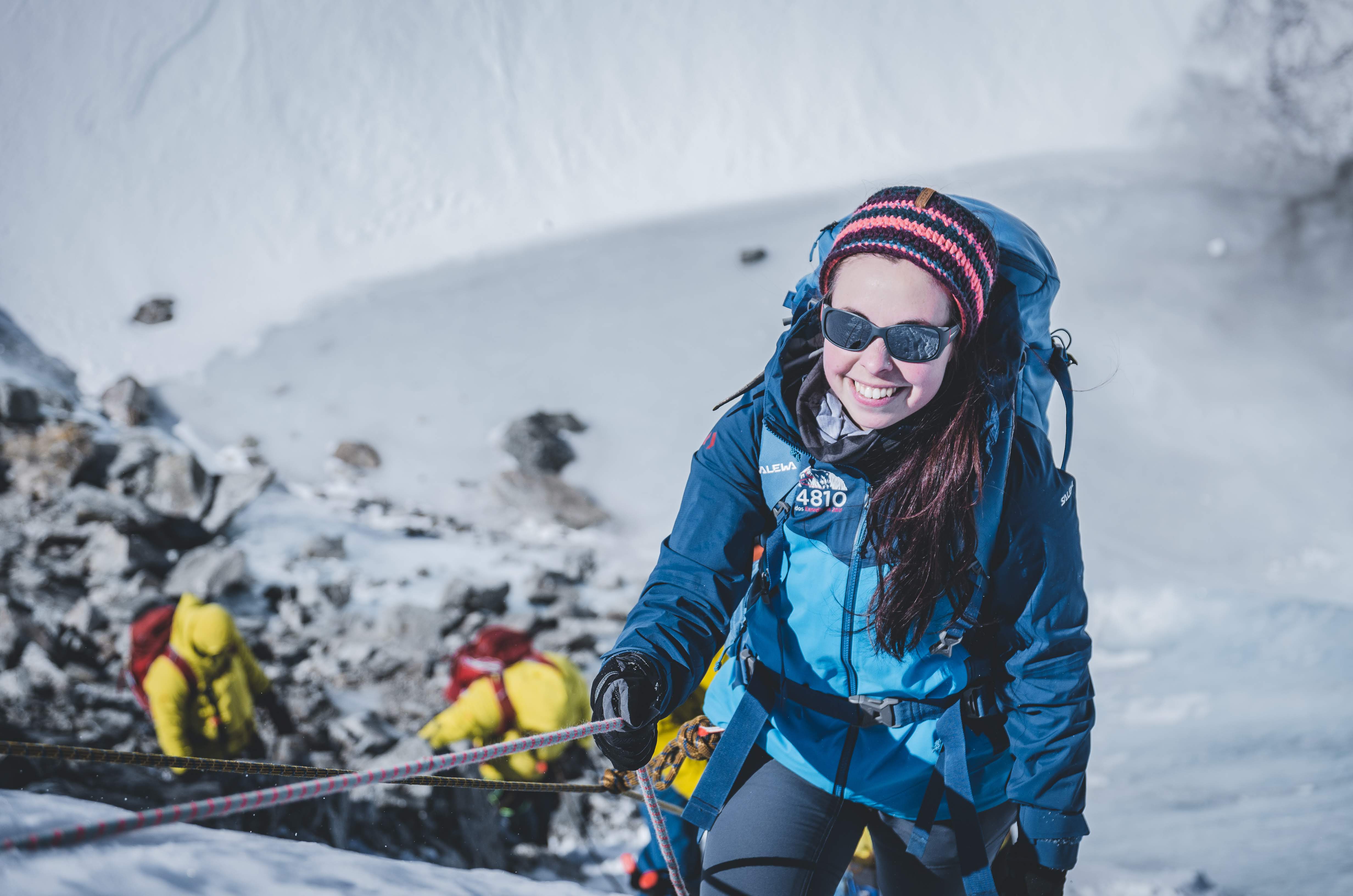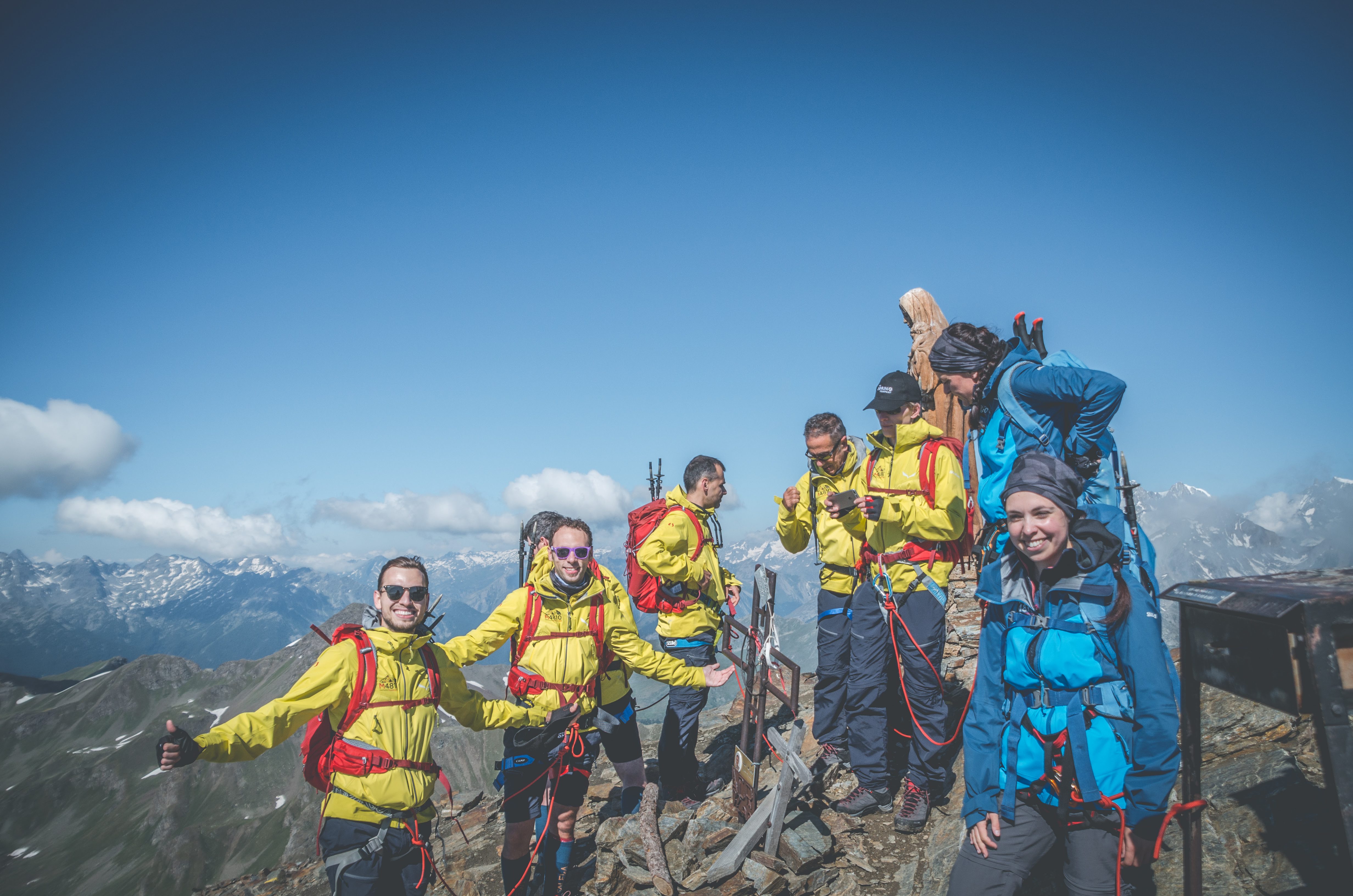
One of the first time that I had spoken to Martina, we were in the bus, heading towards one of the many mountains that we have faced on this expedition up until now.
Chatting, I ask her one of the typical small-talk questions: where are you from?
She looks out the window, and with her hand gestures towards the woods of the mountains behind me. “Basically from here!”
A lot of things began making sense to me in that moment. I understood why she had technical equipment even for the first outings, before we received our Salewa gear. I understand why when I arrive, worn out, to the tops of most mountains, I find her already there, smiling. I also understand that her green eyes must have borrowed some of their colour from the mountains that she calls home.
There she is, one of the real mountaineers of the group, in the true sense of the word. She’s from Varzo, in the province of Verbania, raised among the mountains of Piedmont.
Beyond her many personal hikes and those that she’s participated in with the CAI, she’s got a mountaineering course under her belt, as well as summits like the Monte Leone, and - most recently - the legendary Everest Base Camp trek!
There’s nothing more natural, then, than her involvement in the organisational aspects of the expedition!
It’s her that curates the M4810.com website, that organises the outings, that coordinates with the CAI and the Alpine Guides, that together with them and some other passionate colleagues (Matteo, Paolo and Viola) evaluates the feasibility of the treks.
It’s an honour and a responsibility, because with this kind of strategic role come some thorny issues.
She’s one of the people that most questions the feasibility of this expedition. What will happen if there isn’t enough snow? Which route will we choose? And it’s to her that we turn to regarding practical topics, to which there aren’t always simple answers. For example, how is it possible to include everyone in a three-year journey, even those who join Methodos towards the end of the project?
There are many questions, and - a bit because of her empathetic and meticulous nature, a bit because of the role that she is covering - she has to face them all.
And maybe this is the perfect challenge for her.
“When I found out that M4810 would come to life, that we would actually face this journey to climb the Mont Blanc, I was electrified. Everyone had doubts or fears, but I saw it as just perfect. I almost couldn’t believe it!”

And it shows. I notice her in the mountains, and I have to ask myself how she experiences this journey differently from her colleagues that discovered the mountains for the first time through the expedition outings.
On one hand it’s beautiful, sure, to live your passion at work, making a dream become reality. But on the other hand… isn’t she missing out on something?
This journey, paradoxically, seems to be designed for someone who begins it knowing nothing about the mountains. The perfect project for change, growth, and evolution.
How about for those like Martina, for whom the challenge - the evolution that they carry within themselves - seems less evident while we’re at these lower altitudes? Does the change process, the changeability challenge that Methodos promotes, still take place?
It’s exactly this that I ask myself during our last outing, while I watch her climb along the steep slope of ice and snow that more than just a few of us struggled with. I take a photo of her, and she poses with a smile. “Marty, can you at least pretend that you’re struggling?!”, I say, jokingly, and she starts to laugh.
My question remains: what is her challenge?
It’s a new perspective, one that I haven’t yet used to look at this adventure, and I can’t help but ask her.
She thinks for a minute. “It’s true, it’s probably less challenging for those who are already familiar with the mountains. It lacks that element of the unknown, of constant novelty, of discovery with every step. I almost envy that feeling of fresh starts.
But it’s actually alright like this, because I begin to understand that maybe the most beautiful part is seeing the change within the others, of those who have never been and aren’t familiar with this environment, those who will go beyond their limits, one step at a time. And being there, with the others, makes me understand myself better from their eyes. It’s a question of listening: to my colleagues and to how I relate to them.
It’s being a change management consultant in this situation as well. Now, when I’m in the mountains on an M4810 outing, I don’t just do it for myself, but - for the first time - also for the others. I observe them facing their own challenges, and try to help them as much as I can… I create a real change project, from the valley to the peak.
I figured out that, during the expedition outings, I give more value in this aspect than in any other. And you know what? I only figured it out today.
I’m very competitive by nature, and the call of the peak for me is very strong. I don’t think I’ve ever held back.
But today it happened - and it made me think.
After the first part of the hike with crampons, when the groups got divided, I would have liked reaching the second valley… but my group didn’t have the time to do it. At first I felt a bit disappointed because I had all the energy to do it. Then I realized that in that moment what counted was the result that we achieved together, that it was worth much more. I looked at each of my colleagues and friends - I looked at them one by one - and I saw their effort, their challenge. I saw the courage they had to face this change, the altitude, the snow, the crampons, the fatigue. And I saw that we had already won, we had done it as a team. So the second valley, for me, suddenly meant nothing at all.

This is what’s giving me a new perspective on many things, even on working with clients.
The theme of collective results against the isolation of the individual is very pertinent to change management. We’ve had projects studied to perfection that didn’t manage to bring the desired results because some strong personalities were unable to embrace the challenge of the group.
I’ve always experienced it, though from the outside, as a professional.
It’s the first time I’m trying it myself and I can really see the difficulties… but also the ease with which they can be overcome when we really believe in our cause. I think this is one of the biggest lessons I’m learning in this adventure - the one that will make a difference even in our projects with clients.
The idea that we can replicate what we’re doing - what we’re learning - with others is very inspiring. It pushes me to be even more careful and precise in the planning phases, observing the possible dynamics that can be used as examples when we speak about the project to a client, or the possible challenges that they may have. A whole new world that appears before us, isn’t it?”
I think about it, while Martina is called by a colleague who wants to ask her something about the outing, and I smile. It’s in these moments that I feel, more strongly than ever, the pull that this expedition has on me.
It’s not a change that regards the mountains that we’re facing.
It’s not really about learning to climb mountains. Or rather, that’s the easiest part.
These are change management consultants, and the real challenge that they’re posing for themselves is going beyond their own limits, beyond their capacity to face change.
Because it’s only like this that they can help their clients do the same.





